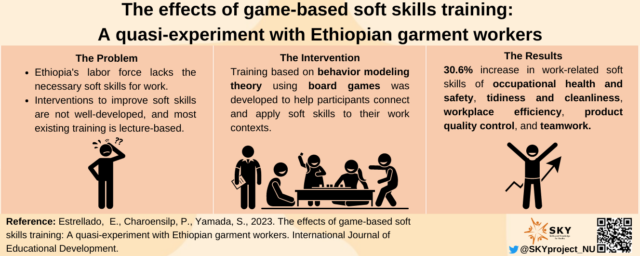
The effects of game-based soft skills training: A quasi-experiment with Ethiopian garment workers2023.06.23 Emmanuel ESTRELLADO Africa

The SKY Project group from the Graduate School of International Development at Nagoya University in Japan studied the effects of behavioral modeling training using board games on the work-related soft skills of Ethiopian garment workers. After the game-based behavior modeling training, the team found a 30.6 % increase in self-reported work-related soft skills of occupational health and safety, tidiness and cleanliness, workplace efficiency, product quality control, and teamwork. Their findings suggest an alternative training method for developing soft skills. The study was published in the International Journal of Educational Development.
Soft skills are an essential determinant of worker productivity. However, Ethiopia’s labor force lacks the necessary soft skills for work. Interventions to improve soft skills are underdeveloped, and most training is lecture-based.
The group led by Professor Yamada from the Nagoya University Graduate School of International Development, in collaboration with the Kaizen Excellence Center in Ethiopia and with support from JICA Ethiopia, found that behavioral modeling training using board games helped participants connect and apply soft skills to their work contexts. Workers who received behavioral modeling training based on board games reported significantly increasing their work-related soft skills.
The project team’s findings strongly suggest that training based on a behavioral training model and using board games are practical for training and improving soft skills among Ethiopia’s garment workers. Prof. Yamada highlights game-based training’s potential as an alternative approach to the prevalent lecture-based training in Ethiopia. The study demonstrated that by using board games to represent simplified workplace realities and combining them with a BMT approach, our one-day training program could minimize the resources required to effectively train soft skills and incorporate work-simulated rehearsal opportunities for better motivation, retention, and skills transfer.
This study also shows the factors that determine the levels of soft skills possessed by worker trainees. According to the study, inexperienced and freshly employed workers gain the most from the game-based training program. The team proposes that similar interventions be offered to new hires to prepare and equip them with the soft skills required for the world of work ahead.
The study also shows managers and line supervisors are more efficient and team-oriented than their lower-level counterparts. The findings indicate that, of the five areas of work-related soft skills investigated in this study, these two are the most valued in management positions in Ethiopia’s textile sector. Our program helps train rank-and-file workers, but it can also assist aspiring and present managers to perform better at work.
The study, “The effects of game-based soft skills training: A quasi-experiment with Ethiopian garment workers,” was published in the journal International Journal of Educational Development on June 13, 2023, at DOI: 10.1016/j.ijedudev.2023.102823.


